Miami and South Florida have been booming. City of Miami Mayor Francis Suarez joins me to talk about their success and the "Miami model" of urbanism. We discuss:
Miami's transition from America's most dangerous big city to one of its safest.
Why Miami is an emerging national and global business center
The inflection points that boosted Miami's trajectory
How Mayor Suarez, a Republican, and his party have found success in a big, dense, diverse, heavily Latino city.
What Miami will do next that will surprise people.
I also wrote a column for Governing magazine about how Miami is an under-heralded urban turnaround story.
And I drew on this interview in a recent piece for American Compass on why conservatives should care about cities.
Because this podcast is with an elected official, I commissioned a verbatim transcript, which is posted below the video of our conversation.
Transcript:
Aaron: Mayor Suarez, thank you so much for joining me today.
Mayor Suarez: Thanks for having me, Aaron.
Aaron: Back in the 1980s, I remember that Miami was known as a hyper-violent city. It was either drug kingpins shooting everybody in town, tourists getting carjacked. The TV show Miami Vice, of course, portrayed it that way. It is a city that was rich but very seedy and corrupt. Today, Miami is one of the safest cities in America. It's still rich, but now it's chic. It's swank. It's a place you want to do business. It's a place you want to come. What changed in that 30 to 40-year period in Miami, I guess really in terms of substance but also the image?
Mayor Suarez: Just about everything. To give some numerical perspective, in 1980, we had 220 [229] homicides in the city. Last year, with a significantly greater population than we had in 1980, we had 31. An 85% decline from our high-water mark in 1980. There's so many reasons why, including, I think, at some level, leadership. One of the things we've done is we've emphasized public safety. A lot of cities in America got into this defund police movement. We never got into that.
A lot of cities across America got into what I consider to be a lawlessness type of culture. We never got into that either. No cash bail and policies like that. We just never could understand why. We don't understand, even being a city that's populated by people who came to this country, oftentimes with nothing, like my parents. And were given all these incredible opportunities to be productive citizens. We feel a sense of debt and gratitude to this country. We are pro-America in every sense of the word.
I think part of that is being a city that understands that law and order is important and has a place. Supporting law enforcement - they have the hardest job in America right now. There's no job that's paid less with more scrutiny and more risk than being a law enforcement professional. Then doing a variety of things that we can talk about to create the conditions for prosperity, which is one of the major drivers of a violent crime. If you're prosperous, and we can talk about some of our prosperity metrics, you're less likely to be committing violent crime.
Aaron: You mentioned prosperity. I think about business because Miami was always known as a place you would go if you wanted to do business in Latin America, sort of a Latin American gateway or a tourist destination. It's still both of those things. But today, Miami is known as an emerging business center where you do business domestically, globally, anywhere. You've got finance industry moving in from Wall Street. A lot of technology firms. Venture capitalists moving in. Why is Miami now perceived as a business destination?
Mayor Suarez: I think we took advantage of an incredible opportunity, which was an inflection point. That inflection point was the sort of transition from the industrial economy to an increasingly digital economy. We started to see that inflection point, that macro transition during COVID. We saw cities that were relatively open, like Miami, versus others that were relatively closed. You saw a huge experiential benefit where people would come. You saw remote work, which gave people the ability to be where they wanted to be instead of where they felt like they had to be.
Then the third dynamic was the SALT deduction going away. Now you have states like Florida that are no longer subsidizing high-tax states like New York, Illinois, or California. Then I think the last macro factor was going back to leadership, right? Which is, I answered the question of what if we move Silicon Valley to Miami with a simple phrase: How can I help? That was very different from what was happening in New York and in San Francisco. In New York, they had kicked out Amazon after winning the HQ2 prize. In San Francisco, they kicked out Elon Musk with a famous tweet that said, "F Elon Musk."
He said, "Message received," and left to Austin to open a gigafactory. We've seen quality of life issues also deteriorate in major cities. I think that's another inflection point. If you read Ken Griffin's interviews, he'll say he didn't leave Chicago because of the taxes. He left because of the crime and the quality-of-life issues that were impacting his employees. We believe that quality of life should be a premium. We think time is the most precious asset that people have. We believe in an experiential economy and an experiential world that we live in, that we want to build our system, our ecosystem around that precious asset and allow people to value it.
Aaron: I actually saw one of the times that you tweeted. You just showed up in the replies to someone's tweet who was complaining about problems in San Francisco. You said, "How can I help?" It's become sort of your catchphrase, if you will. It really is a different approach to a lot of other places. They're like, "Here's what you got to do for us if you want to do business in this town." How do you sustain that open for business ethos when so many other cities just haven't been able to do it in the face of activists or other pressure?
Mayor Suarez: I think it's part of our DNA. I think when you consider the fact that many of us were kicked out of our country of birth or our parents were kicked out of their country of birth. In the case of my case, it was my parents who were told by a very charismatic leader, "Give us all your businesses, give us all your property and don't worry, we'll make everybody equal." He did. He made everybody equally poor and equally miserable. If that's the quality that you want, there are places where you can find that. I find it interesting that nobody is risking their life to get on a boat to go to Cuba but many people are risking their life on a boat from Cuba to come to the United States. You don't see an immigration problem in China, and you see an immigration problem in the US because people want a better tomorrow.
I think part of it is we're defined by the fact that we believe this is a great country. We think that the American experiment of capitalism and of studying and the family unit and us working collectively together to be the best versions of ourself so that we can provide for our families and our future and our communities is a working formula.
Unfortunately, the other side has taken socialism and brought it into the realm of, let's say, first responders and public service in this defund police movements. They've taken it and they've imported it into even climate, even the climate discussion. They've tried to use climate as a means of really social engineering. It's very, crafty, I guess, on their part that they're master manipulators and they find ways to try to manipulate the population. We were the victim of it. It's a lot harder to manipulate someone who's been victimized and who understands the very real consequences of falling prey to these fraudulent ideologies.
Aaron: It sounds like people in Miami still believe in the American Dream where you can get ahead if you work hard and have that entrepreneurial spirit, and it's less about redistributing the spoils.
Mayor Suarez: 100%. That's exactly right. I think, all of us, we all believe that if we work hard, we'll hopefully one day be able to retire and be able to enjoy that part of our life in that way. We also we also love to give back. We don't think that government is the arbiter of success and failure. We don't think that government reengineering is what creates success or failure. When I say how can I help? What I mean is how do we disintermediate government? How do we get out of your lives? How do we facilitate your success? We don't make your success. We don't substitute ourselves for your risk and your capital and your sweat.
What we want to do is sort of like the Hippocratic oath. At first, we want to do no harm. That's the first thing we want to do at a very basic level. Then secondly, we love to facilitate. Third, you would like to think that there are some people in government that have enough of a private sector mentality that they can actually come up with some ideas to help move the ball through public private partnerships or through other means that are actually not overwhelming in terms of government imposition, but maybe create some carrots to get some good things done.
Aaron: You talked about public safety culture and some of this. Is there a Miami model of urbanism that other cities can learn from? What should they take away from your experience?
Mayor Suarez: There absolutely is. I was president of the US Conference of Mayors for a year and a half. I told people as many times as I could and I'll continue to tell them that our model for success is simple. We do three things and only three things and we do them well. We keep taxes low. I lowered taxes to the lowest level in history and we grew by 12% last year. We keep people safe. We have the lowest per capita homicide rate in history last year.
We lean into innovation. We've moved over a thousand companies and $10 trillion in assets under management based companies to Miami and grown our venture capital pipeline by several hundred percent. We built, as you said - and we did it also by changing our reputation as this sun and fun place where you can retire, sun and fun place where you can do business globally, not just hemispherically, not just nationally, but globally.
We're getting a lot of interest from the Middle East. We're trying to branch out into Asia, although we have a limitation in terms of direct flights, which we hope to overcome in the next decade. We're zealous about becoming what I call the capital of capital of the world, but also the capital of capital of our hemisphere for purposes of building, funding and scaling a company.
Aaron: Most cities are overwhelmingly controlled by Democrats. You are a Republican mayor. Obviously, there's a very competitive Democratic Party there, but Republicans have done far better in Miami than other places. How have Republicans found success in what's not just a city, but a very urban, diverse city?
Mayor Suarez: First, I'd like to explain to you numerically what success we've had. When I got elected in 2017, the preceding year, 2016, in the presidential election, Donald Trump lost Miami-Dade County, which is the metropolitan area, to Hillary Clinton by 30 points. I was reelected in '21 by 80%. I was elected in '17 by 85%. The policies that we put into place created so much success that in 2022, the year after I was reelected by 80%, we won Miami-Dade County, Republicans, by 12 and 10 points respectively in favor of the governor and Senator Rubio. That was a 40-point swing in six years.
I think it turns out that people reward, particularly independents - which oftentimes decide presidential elections, and also have a big sway in our county which is about a third independent - when you create policies that are based in part on listening to the population, not punishing the population, and also you create success and prosperity. We had the lowest unemployment in America and the highest wage growth in America. People reward you, and they reward those policies. That's what happened, and all we have to do is maintain that momentum.
Aaron: I think there's a perception in a lot of national Republican circles that the goal is about turnout. They should try to rack up big wins in rural areas, hope that there's not too much urban turnout, but they're not even really hoping to pitch the cities. They don't think they really need the cities to win or they're too uncompetitive in the cities. Are cities important for Republicans to actively go after electorally? What's the pitch to cities for Republicans that you would say if you were advising these parties around the country?
Mayor Suarez: I think they're critical. I think if you can win cities, there's three demographics that I think are winnable for Republicans or that we should be at least playing in these spaces. Young voters, which Republicans lost to Democrats in the last presidential election by 26 points. Hispanics, which I happen to be one, but there's 20 million Hispanics in the United States. It's a huge population - or it's 20% of the US population, might even be 40 million Hispanics or 60 million Hispanics. It's 20% of the US population, so it's probably closer to 60 million.
Maybe 20 million voters that are registered, but 60 million total population. Hispanics are a huge demographic that I think Republicans can do well in because we line up a lot on values. I just think it's a mistake when you look at cities across America, as you've said, most of them are Democrats, and the ones that are failing the most spectacularly, are - I can't imagine you want to live in a city that doesn't seem to be serving your needs. I think that is an opportunity to say, "Hey, look, there are Republican-led cities. They're doing phenomenally well. Republican states are doing phenomenally well."
There's a massive migration to red states from blue states. I think, I think it would be foolish. Look, if Republicans just want to barely win elections, we'll implement the strategy you were articulating which is to do well in rural areas, ignore the urban areas, and drive turnout. That's, you can win elections, but you can also lose elections like that. We've seen the Republican Party lose a lot of elections that way.
I think to win elections, to win them generationally, you have to change paradigms. I think those are three paradigms that even if you don't win the city, if you go from an 80-20 loss to a 60-40 loss, it's a big difference. It's the same with Hispanics. If you break even with Hispanics, huge difference. I think you can win Hispanics. With young voters, there's no reason why a guy, a president who cannot connect with young voters should beat a Republican candidate.
Aaron: Yes, you mentioned the Hispanic vote. Obviously, Miami is a very large Hispanic population, which traditionally, again, has not been fertile territory for the Republican Party. Republicans are doing very well there. Obviously, Hispanics are very diverse. There's no Hispanic voter, per se. You've done very well in a very multicultural city. What would your advice be to some interior red state Republican whose states are becoming more diverse? They haven't had that history of appealing to those multicultural voters. How they should go about trying to do that?
Mayor Suarez: I think it starts with understanding what you precisely articulated, which is that Hispanics are not a monolith. You cannot brand them, like the Democrats have done with Latinx. Then you try to go micro like First Lady Jill Biden did and said that they were as unique as San Antonio tacos. That's not going to work either. I think you understand that each Hispanic culture has its own heritage, its own history. I think I'll give you a perfect example of something that was done very successfully here in Dade County, which is Donald Trump's Cuba policy and Venezuela policy - were both targeted based on and developed based on listening to these communities and what they really wanted. He reaped massive rewards. It took courage, to create a coalition government in Venezuela. Ultimately, unfortunately, the Biden administration didn't do anything with it, basically ignored it, has also ignored Cuba, in my opinion. This is the problem with the US, we see things, problems like immigration, but we don't focus on why there's an immigration problem. There's an immigration problem because you have socialist countries in our hemisphere that are impoverishing their people and creating pressure on the US. That's how it flows.
We're giving China $400 billion annual surplus, plus they're stealing another $200, $250 billion of our technology on an annual basis. It's a $500 billion plus wealth transfer. We could be using that money to reinforce democracies that have our value system in our own hemisphere, to reshore the making of our supply chain in a way that depressurizes immigration, creates less - We have China and Russia in our backyard. We see articles about it every day, whether it's through Belt and Road's initiative of China, or whether it's Russia being, and China also provoking in Cuba and creating military antagonism there. We're just not being very intelligent about how we're using our resources. I think Hispanics get that.
I think Hispanics are very pro-family values. They're pro-America. There's this perception that because you're Hispanic, you don't believe in a strong border. I don't think that's true. I think Hispanics are very law and order. Again, it's understanding Hispanics, it’s understanding the nuances of different Hispanic cultures so you can communicate directly with them on issues they care about. I think Republicans have, frankly, done far more effectively than Democrats in the last couple of cycles. We have to continue the process like you said. It's definitely not a foregone conclusion or a mission accomplished type of situation.
Aaron: The last question I have is, what is Miami going to accomplish in the next few years that's really going to surprise people?
Mayor Suarez: I think what we'll do in the next 5 to 10 years that will surprise people is I really believe that we're going to have a premium educational institution in the next 5 or 10 years that is on par with some of the best educational institutions in the world. I just don't see how Miami continues its growth without it, frankly. I don't see the people that are coming here allowing that deficiency to continue.
We have great educational institutions, but I'm talking about premier. I'm talking about best in class, best in the world, best in the country. When you think about why does Silicon Valley, even though everything is being horribly run, their tax structure, homelessness, crime, and everything that you can possibly think of, they still led the first quarter in venture capital investing. It's because they have the talent.
The talent is being born and bred in Stanford, and it's being funded in the Valley. We have to replicate and beat that model. I think we can do it, particularly in a landscape today where higher education has become so politicized. There's a huge opportunity with university presidents that won't condemn what Hamas did on October 7, which was horrific and reprehensible, and something that anyone who understands history understands what's going on in that part of the world. Those are opportunities for places like Miami, and I think we're going to capitalize on them.
Aaron: With the wealth moving into the city, there's certainly enough financial firepower to make that happen.
Mayor Suarez: For sure.
Aaron: Yes, absolutely. Mayor Suarez, thank you so much for taking time to talk with me.
Mayor Suarez: Thank you, Aaron. Have a good one. Be good.


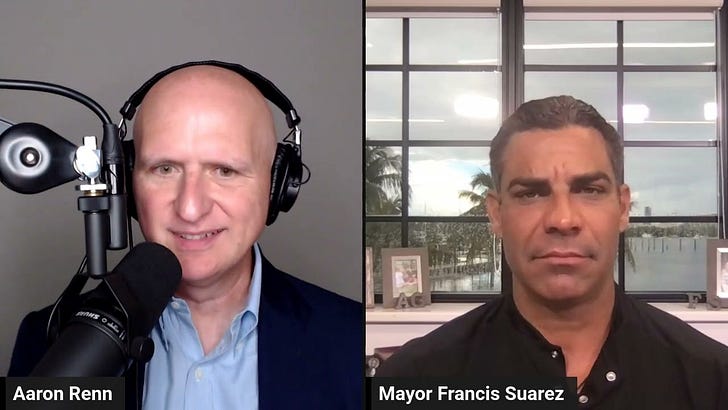




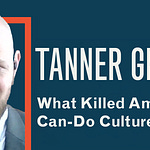
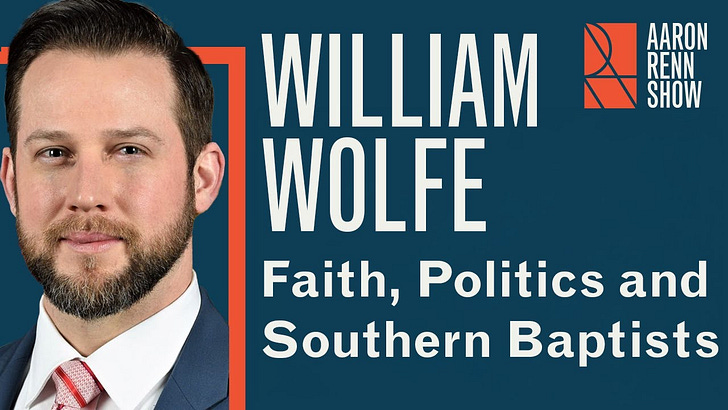

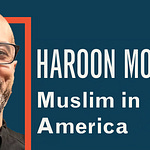

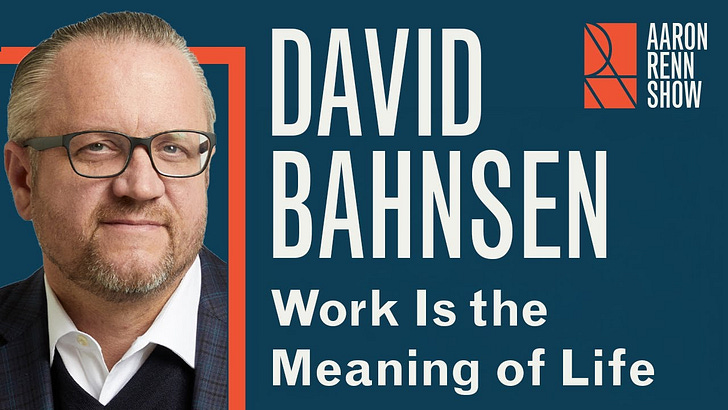
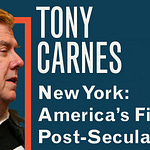
Share this post